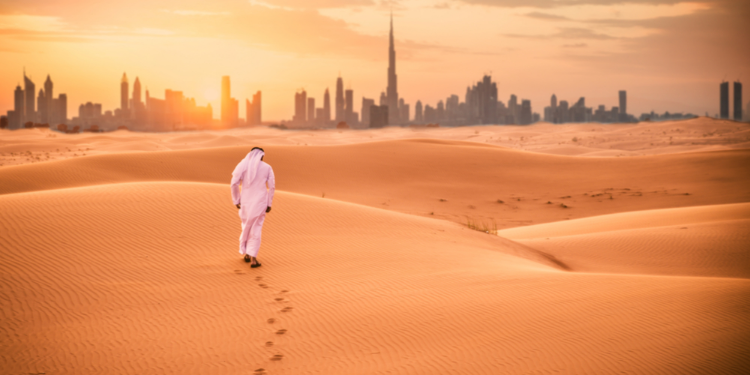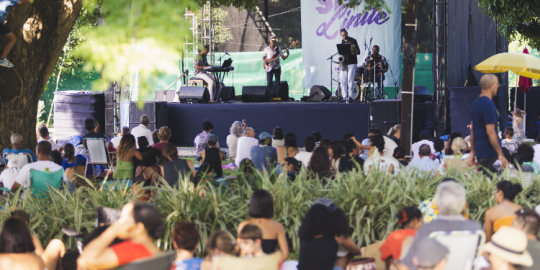It's a vast desert

Saudi Arabia, the United Arab Emirates, Qatar, Oman, Bahrain and Kuwait, etc., are only a few countries that form part of the Middle East. While the region is most famous for its deserts and arid landscapes, it is also home to some of the world's most prosperous and fastest developing economies. For many years, petrol was the primary natural resource, but Middle East economies have greatly diversified since then. Various opportunities are therefore available for foreign professionals and entrepreneurs. Finance, trade, new technologies, and tourism are the most promising fields. Major cities like Riyadh, Abu Dhabi, Dubai, and Doha are dotted with gigantic ultra-modern skyscrapers. You can also find parks and playgrounds in most of them. You must have heard of Palm Islands, a famous artificial archipelago located in the Persian Gulf and which is in the shape of a palm tree. The most luxurious hotels and the largest shopping malls in the Middle East are there. On the other hand, adventurous expats can enjoy a wide range of activities in the desert.
Danger is everywhere

If you've never dared going beyond your dream of moving to the Middle East, maybe now is the time. There are some risks, of course, like elsewhere in the world. Moreover, travellers are advised to avoid countries like Libya, Lebanon and Syria due to ongoing conflicts. However, the Middle East as a whole is a fairly rated region regarding safety even though it's recommended to be careful in all circumstances. You may be surprised to know that the United Arab Emirates is among the most peaceful countries in the world, attracting more than 15 million tourists every year. Shopaholics mostly flock to Dubai. In 2017, Riyadh was also among the 50 safest cities in the world thanks to government efforts to maintain law and order and guarantee safety. Located in the Arabian peninsula, Qatar is another peaceful country. Most Qataris live in Doha, a city known for its futuristic architecture, splendid beaches, vibrant social life and nightlife, and safety. Generally, it's very safe to walk down its streets and in the local markets.
You have to speak Arabic

Arabic is without any doubt the predominant language in the Middle East, spoken by 280 million residents. It shouldn't even surprise you since there is a massive Muslim population in the Middle East. Arabic also has many dialects, varying from one region to another. However, Arabic is far from being the only language in the Middle East. Persian, for example, is second to Arabic with 65 million speakers, and is followed by Hebrew, Turkish, and many other Berber languages. Globalisation led to the introduction of foreign languages like English in the Middle East. Today, most of the educated people in the Middle East understand, and can speak, read, and write English, so you don't really have to learn Arabic if you're planning to move to big cities like Abu Dhabi, Doha, Riyadh, or Manama. Moreover, language teaching is one of the most promising fields in the Middle East. Many English teaching jobs are available in Saudi Arabia, Qatar, the United Arab Emirates, Oman, and Jordan. However, even though you can get away with English, knowing Arabic can also help you adapt more easily.
Everyone is a Muslim

It may be hard to believe, but the world's largest Muslim community is not actually in the Middle East, but the South East Asian country of Indonesia. We often tend to think that everyone living in the Middle East is Muslim since Islam is the main religion. However, other religions like Christianity and Judaism are also very present, and thanks to global immigration trends, anyone can practice their religion in Middle East countries. While many Muslims have chosen to move to the USA, Canada, and Europe, for example, many https://www.expat.communities have also settled in Middle Eastern countries over the years – which probably explains the booming real estate market. Career and investment opportunities keep attracting expats from all around the world, including Asians, Europeans, and North Americans. Therefore, it would be wrong to say everyone in the Middle East is Muslim.
Women are excluded

In general, women have to wear the veil in the Middle East. However, it's more a question of personal choice rather than a rule. Wearing the hijab is a matter of cultural, family, and personal values. Today, women are free to choose whether they prefer to wear the veil, but this doesn't mean that they will roam around in short dresses, skinny jeans, and sleeveless tops. All women in the Middle East, including expats, are required to dress appropriately and respectfully even though pants and skirts are allowed. Another misconception is that only men are allowed to work while women have to look after their family and kids. As in most developed regions, women can also pursue higher studies and work in the Middle East. In recent years, women's participation in politics showed some progress. Today, women account for 7% of Arab parliaments. Also, you probably know that women are now allowed to drive in Saudi Arabia like in most Middle East countries.
















